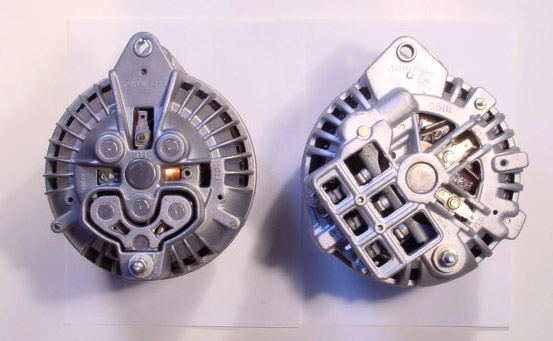I don't know where you people get this stuff. VERY FEW Chrysler alternators were 65 A. Just because you had a "dual field" (correct term is "isolated field") does not mean it's high amperage. (I don't know what the smallest "squareback" was, 40? A)
The weak point is the bulkhead connector, ammeter. See this article
http://www.madelectrical.com/electricaltech/amp-gauges.shtml
The PROBLEM is that rebuilders can rebuild just about any case into just about any amperage. So unless you KNOW you have an undisturbed original alternator, you don't know what amperage it actually is.
Worse, the rebuilders sometimes drill the case and put a non factory isolated brush holder in the older cases, so here's what the possibilities are:
Original pre 69 case, single insulated field connector
Modified pre 69 case by a rebuilder with added field connector
Early "roundback" 70 / later isolated field
Later "squareback" 73? later isolated field THESE ARE BETTER FOR LOW RPM
Below, on the left is a "round back" that is an oddball case. This alternator has a grounded brush (pre 70) installed at 9 o'clock, and an isolated brush at 12 o'clock, but a factory hole for an isolated brush at 3 o ' clock
The alternator on the right is a superior "squareback" which is what you should GET. Ask for a "mid seventies" alternator and do NOT accept a "roundback"
Unless you have, or plan to do the MAD ammeter bypass, I would not get more than about a 50A alternator.


















